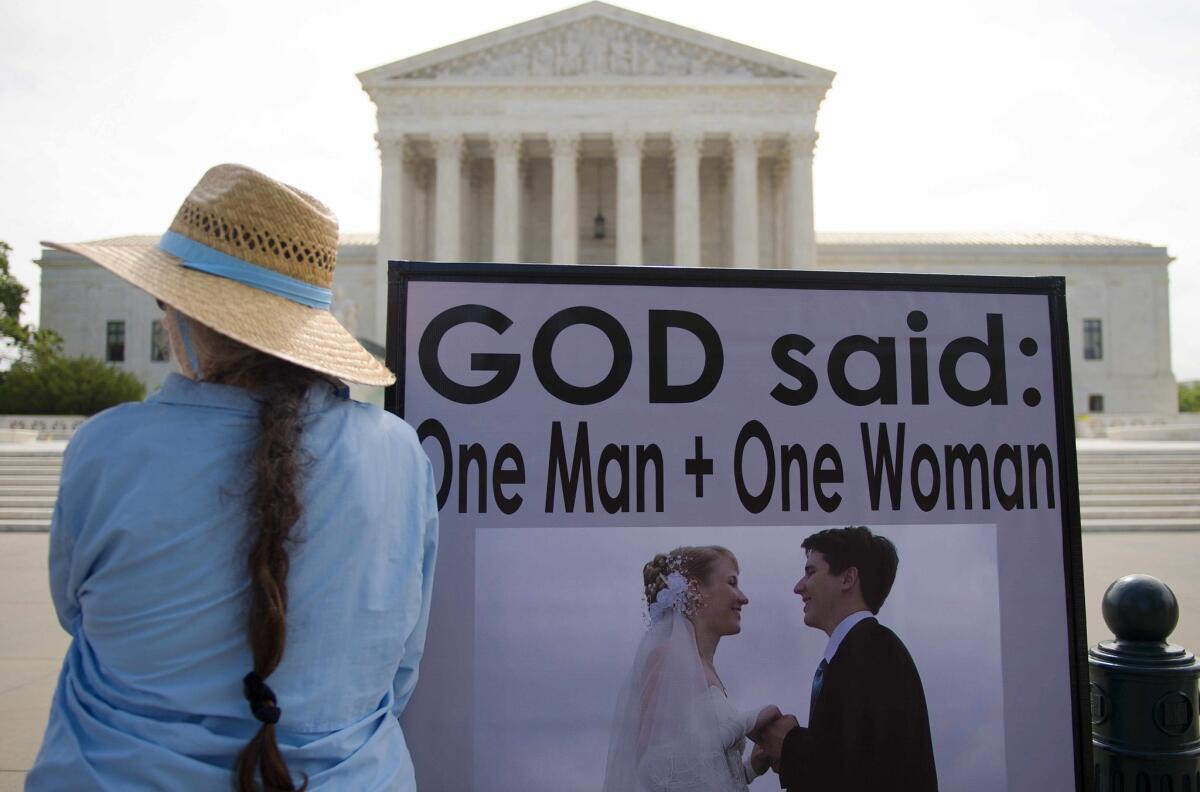After the Supreme Court ruling, marriage for none?

An anti-same-sex marriage demonstrator stands in front of the U.S. Supreme Court in Washington on June 18, awaiting the court’s landmark decision.
- Share via
Good morning. I'm Paul Thornton, The Times' letters editor. It is Saturday morning, June 20, the day before the summer solstice. Here’s a look back at the week in Opinion.
Any day now, the Supreme Court may deliver the decisive blow that marriage equality advocates have long sought: a decision saying the 14th Amendment to the Constitution precludes states from passing laws prohibiting same-sex couples from getting married. But in some states, a decision affirming marriage equality might not mean a trip to the county clerk or courthouse for same-sex couples -- or opposite-gender ones.
In an op-ed article, law professor Ethan J. Leib describes the strategy of some who oppose same-sex marriage. I’d call it a perversion of the "if I can't have it, no one can" defense: If everyone can have it, no one should. Leib writes:
Assuming the conventional wisdom is correct, the Supreme Court will rule this month in Obergefell vs. Hodges that because the 14th Amendment guarantees equal protection under the law, states cannot ban same-sex marriage. Some conservatives, however, will almost certainly balk, and will cast about for a solution that would save them from outright rebellion against a court decree.
One idea already in the air is to try to disentangle the awkward union between marriage and the state.
In Alabama, a bill passed the state Senate that would stop the government from issuing marriage licenses or certificates — to anyone. Instead, couples who wanted to get married would just sign a legal contract and file it with a public official.
The Oklahoma House passed a similar bill, specifying that the state would no longer provide licenses for marriage. It would, however, continue to record certificates contracted before or solemnized by religious officials or judges….
Notwithstanding the plausible argument that the Supreme Court has, in prior decisions, created a fundamental right to marry, states may contend that there can be no constitutional denial of equal protection to any person within its jurisdiction if they offer marriage licenses to no one, straight or gay.
Absent an actual Supreme Court decision on marriage, journalists are reading the tea leaves. Justice Antonin Scalia's characteristically cranky and bombastic opinion in an immigration case involving marriage signals he might believe the fight against marriage for all is lost. L.A. Times
Decisions favoring gay marriage and saving Obamacare subsidies for millions would be a blow to "the destructive creed of state rights and state sovereignty," writes Andres Martinez, a former editorial page editor of The Times. Martinez mentions his experiences penning pro-marriage equality editorials for The Times and other newspapers, with some resistance from his bosses. Zocalo Public Square
The official symbol of progressive, inclusive California -- the Bear Flag -- celebrates the work of racist, drunk and murderous 19th century belligerents. Alex Abella says the flag that flies over government buildings shouldn't be the standard waved by squatters who stole natives' land and kidnapped Spanish-speaking Californios. L.A. Times
Dump the Bear Flag? Nonsense, say readers. "The Bear Flag flies over public buildings in every corner of the state. Long may it wave," writes Claremont resident Ted Trzyna in a letter to the editor that echoes the reaction by many other readers. L.A. Times
A piece of Holocaust and Hollywood history is for sale in Santa Monica, but on Redfin and Trulia it's listed as just another high-priced slice of real estate on the Westside market. The home on Mabery Road in Santa Monica Canyon belonged to Salka Viertel, the screenwriter who left Germany before the Nazis came to power and took in refugees who fled Europe; she also landed on the FBI's watch list during the anti-Communist craze of the 1950s. "Tear-downs are not unusual in this market, but this place deserves a plaque and some serious respect," writes Donna Rifkind. L.A. Times
Eric Garcetti was caught leaving town just when Los Angeles needed him -- but what's worse is that the mayor didn't come clean about the reason for his ill-timed trip to Washington (to attend a fundraiser) until a reporter found out about it, says the editorial board. "Los Angeles, at a sensitive time, wants to know its mayor is on the job, on the spot and, most important, that he is being forthright about his actions and activities." L.A. Times
That Garcetti was called out for his evasiveness may indicate a more "skeptical press corps." Kevin Roderick rounds up recent coverage that puts the mayor in a less than flattering light. LA Observed
Skeptical readers, send us your emails, especially if you have feedback for how we can improve this newsletter. Email paul.thornton@latimes.com to share your thoughts.
